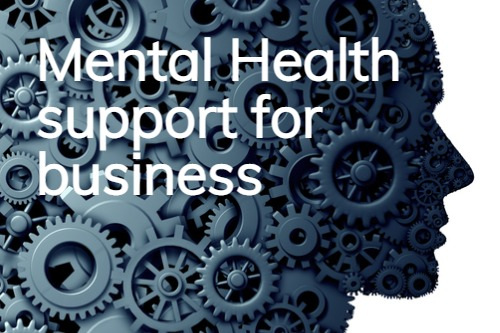Looking after our Minds in Business

Authored by QBE Head of Trading Steve Field
Employers should develop wellbeing strategy to safeguard staff mental health and promote a healthy business
Across the world, there have been an additional 75 million cases of anxiety, stress, and depression since the start of the pandemic.
The scale of this statistic is staggering – and many will be struggling with these mental health issues while continuing to work.
In the UK, recent figures have revealed that working days lost due to sickness absence rose to 2.6% in 2022, the highest it has been since 2004. That equates to 185.6 million days lost – a rise of 35.8 million days in just one year and a huge hit to the economy.
Digging deeper, the minor illnesses figure has risen sharply – potentially including non-disclosed mental health struggles. Meanwhile, recorded instances of existing and new cases of workplace stress, depression and anxiety have reached 914,000 (March 2022) representing a sizeable 14% jump from the previous year.
Employers and workers are clearly under pressure, and the numbers are growing.
Adding to concerns, our own research has shown that a quarter of workers hide mental health challenges from their employers – and nearly a third (31%) say they would not feel comfortable disclosing a mental health issue to their employer.
Why is this so important?
The consequences of poor mental health on workplace activities are, as you might expect, multifaceted.
One of the more obvious results is a rise in absenteeism. Even before the pandemic, mental health issues were the single largest cause of working days lost in the UK, accounting for 54% of lost days.
However, absenteeism isn’t the only mental health risk to business. The presence of poor mental health in workers can result in a range of less obvious outcomes.
For example, an individual suffering from stress, anxiety or depression is unlikely to operate at full capacity. Those feeling stressed are more likely to be distracted; those experiencing anxiety are less likely to focus or more likely to overreact; and those suffering from depression may avoid interaction and demonstrate reduced motivation.
In terms of risk management, a lack of focus may decrease situational awareness; disengagement and increased fatalism may lead to an absence of care about risk; and reduced self-control may actively create risks.
As an insurer, we’re very aware that potential losses covered by casualty, property, motor, and professional insurance policies could easily be influenced by adverse mental health conditions. Human error is often the unrecorded, or ‘hidden’ claims driver, but we know that customers with mentally resilient workforces have fewer accidents.
Mentally robust workforces hold an improved claims profile compared to those where employers and/or employees do not make a link between mental health and workplace behaviours.
Additionally, businesses suffer financially when employees don’t feel secure to disclose details about their mental health. Another consideration is that workers will observe reactions to colleagues in similar circumstances, before deciding whether to speak up or seek help themselves.
It’s a huge mistake to place the management of risk related to mental health below the processes and checks applied to physical and financial risks. Remember, your business is only as resilient as the most vulnerable link in its mental health chain.
Three key areas employers should develop to safeguard staff wellbeing and promote a healthy business:
1. Develop knowledge and awareness
• Schedule training to ensure people managers have the appropriate knowledge and skills to identify signs of poor mental health and signpost workers to advice and support
• Understand the influence of personal circumstances on overall wellbeing and offer support for workers which will directly ease pressure
• Conduct a wellbeing survey to track progress, expand employer awareness of pressure points and demonstrate meaningful engagement
2. Build an inclusive culture
• Show commitment to staff wellbeing with specific policies that support good mental health and self-care (flexible working, health benefits, support networks) and events/workshops to help workers navigate issues
• Communicate openly about the challenges of poor mental health (and possible solutions) to improve wellbeing and reduce historical or cultural stigma
• Promote existing mental wellbeing offerings (such as Mental Health First Aiders or company networks) with regular internal communications
3. Create an employer toolkit
• Establish a mental health risk management strategy and plan for your workforce, including identification and implementation of controls, reporting processes and metrics, mitigative actions and incident investigation
• Identify areas for improvement and create a timeline for revisions of outdated policies, data collection or support programmes to ensure changes are made in a timely manner
• Include metrics for transparency and accountability reporting to grow employee confidence in an inclusive company culture
Minds in Business
At QBE we see a significant need for mental health and wellbeing strategies in many of our customers’ businesses. To help support them – and the various industries they operate in – we have collaborated with the mental health charity Mind, organisational culture and human error specialists Anker & Marsh and resilience specialists Petros, to build a mental health optimisation tool.
Unique in the insurance market, customers of QBE can engage with a series of targeted questions designed to deep dive into:
- Leadership
- Planning (including ESG)
- Support
- Organisational confidence and capability
- Performance Evaluation
Responses to these questions inform the assembly of a bespoke risk improvement plan alongside a proposed timeframe for completion.
In turn, this plan can form the basis of a wider workforce wellbeing strategy enabling businesses to evaluate their mental health journey and identify areas for improvement. The process also includes access to a suite of resources and guidance, a large proportion of which is offered by our specialist partner provider panel.
Even a small positive change in an employer’s approach to wellbeing and mental health can substantially address and change workplace pressure points resulting in happier employees, fewer accidents, and incidents – and an improved claims experience.
About QBE
QBE European Operations is part of QBE Insurance Group, one of the world’s leading international insurers and reinsurers and Standard & Poor’s A+ rated. Listed on the Australian Securities Exchange, QBE’s gross written premium for the year ended 31 December 2018 was US$13.7 billion.
As a business insurance specialist, QBE European Operations offers a range of insurance products from the standard suite of property, casualty and motor to the specialist financial lines, marine and energy. All are tailored to the individual needs of our small, medium and large client base.
We understand the crucial role that effective risk management plays in all organisations and work hard to understand our clients’ businesses so that we offer insurance solutions that meet their needs – from complex programmes to simpler e-trading solutions – and support them in minimising their risk exposures. Our expert risk management and rehabilitation practitioners focus on helping clients improve their risk management so that they may benefit from a reduction in claims frequency and costs.

